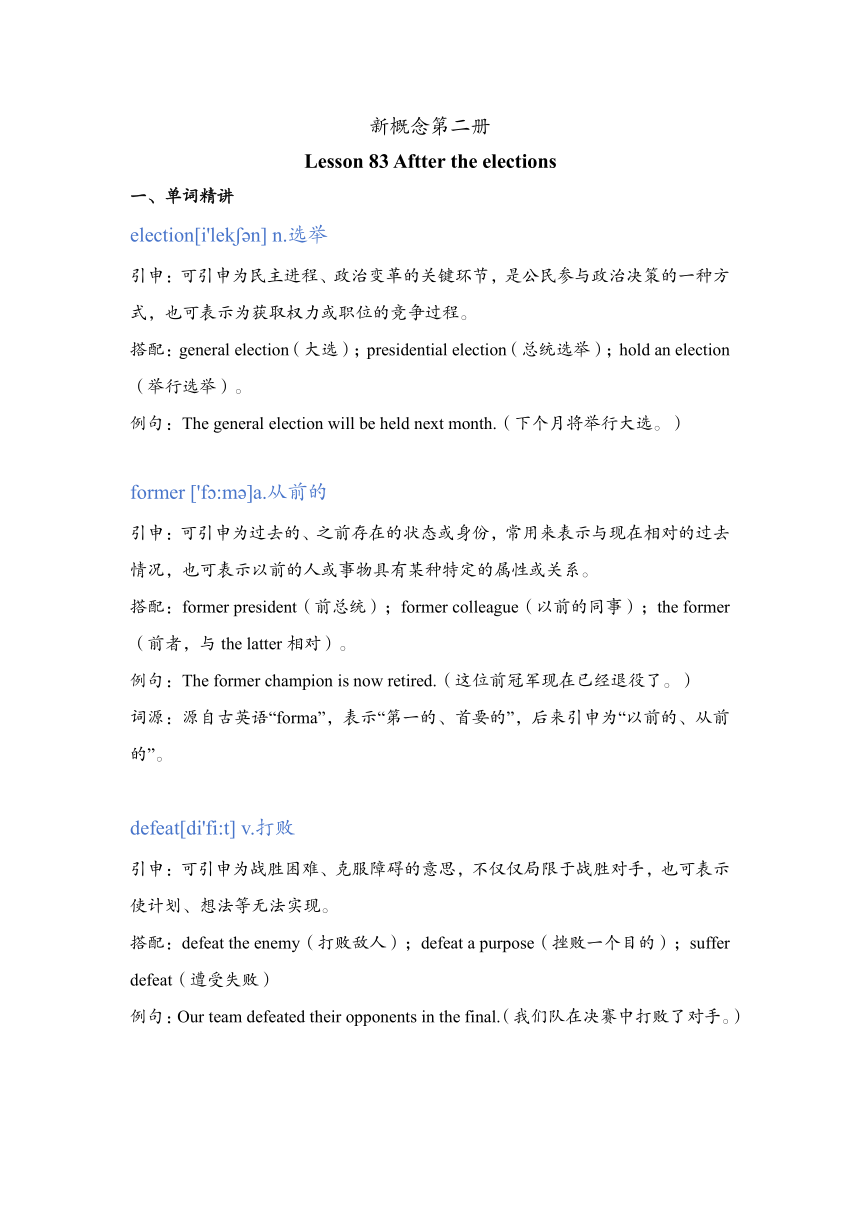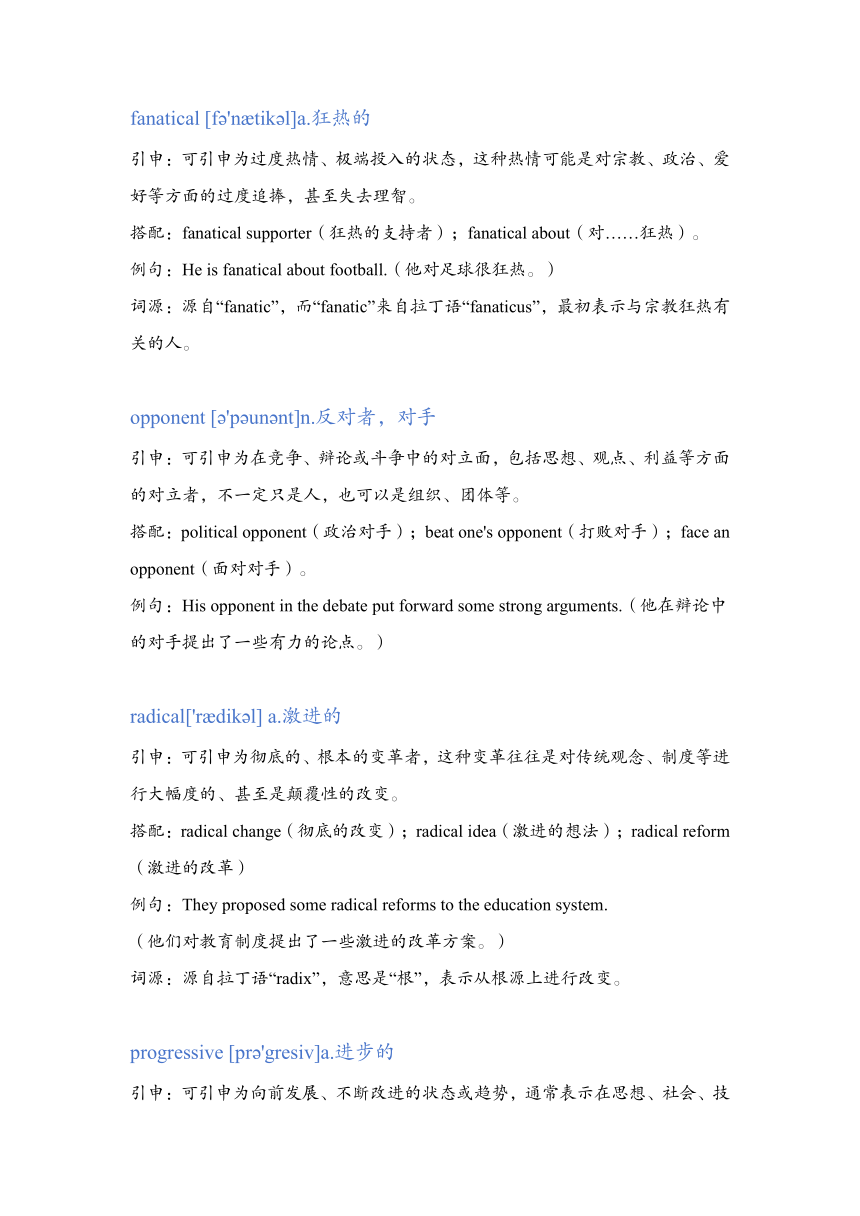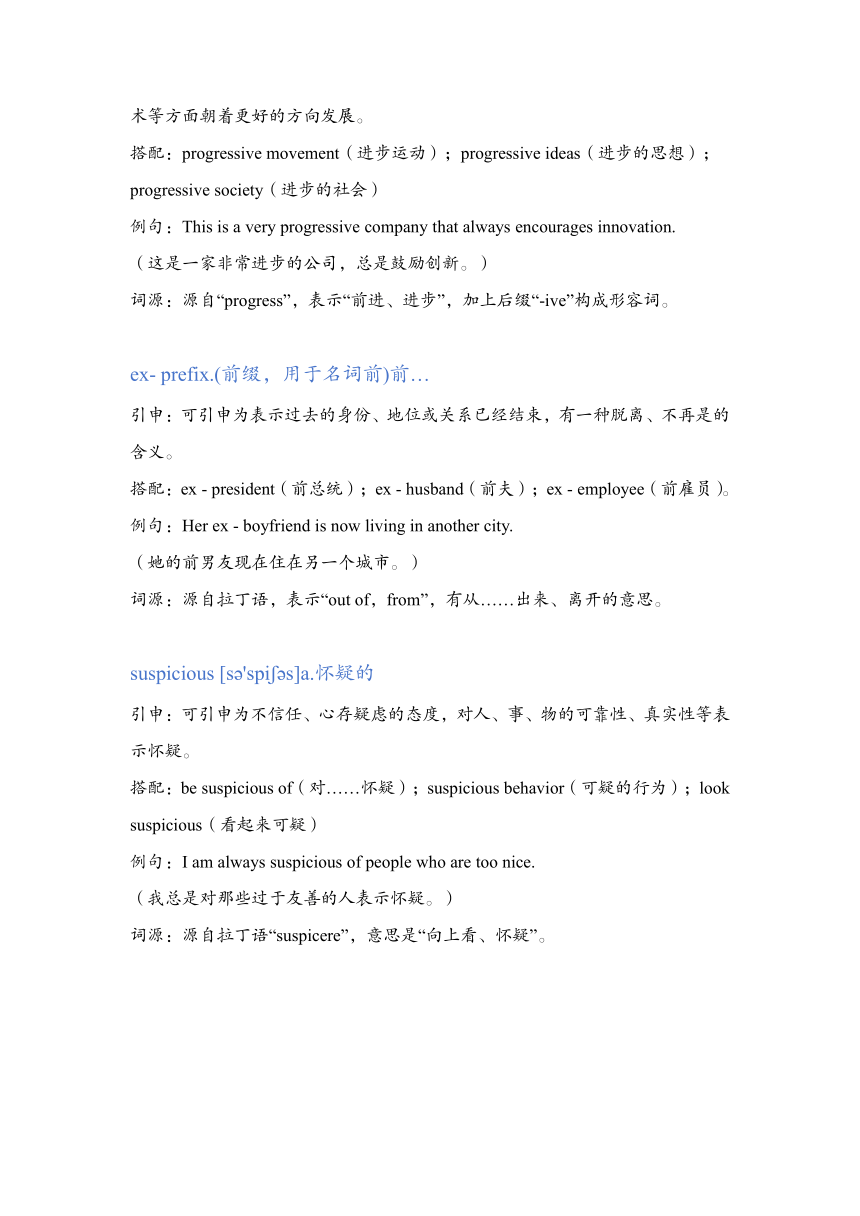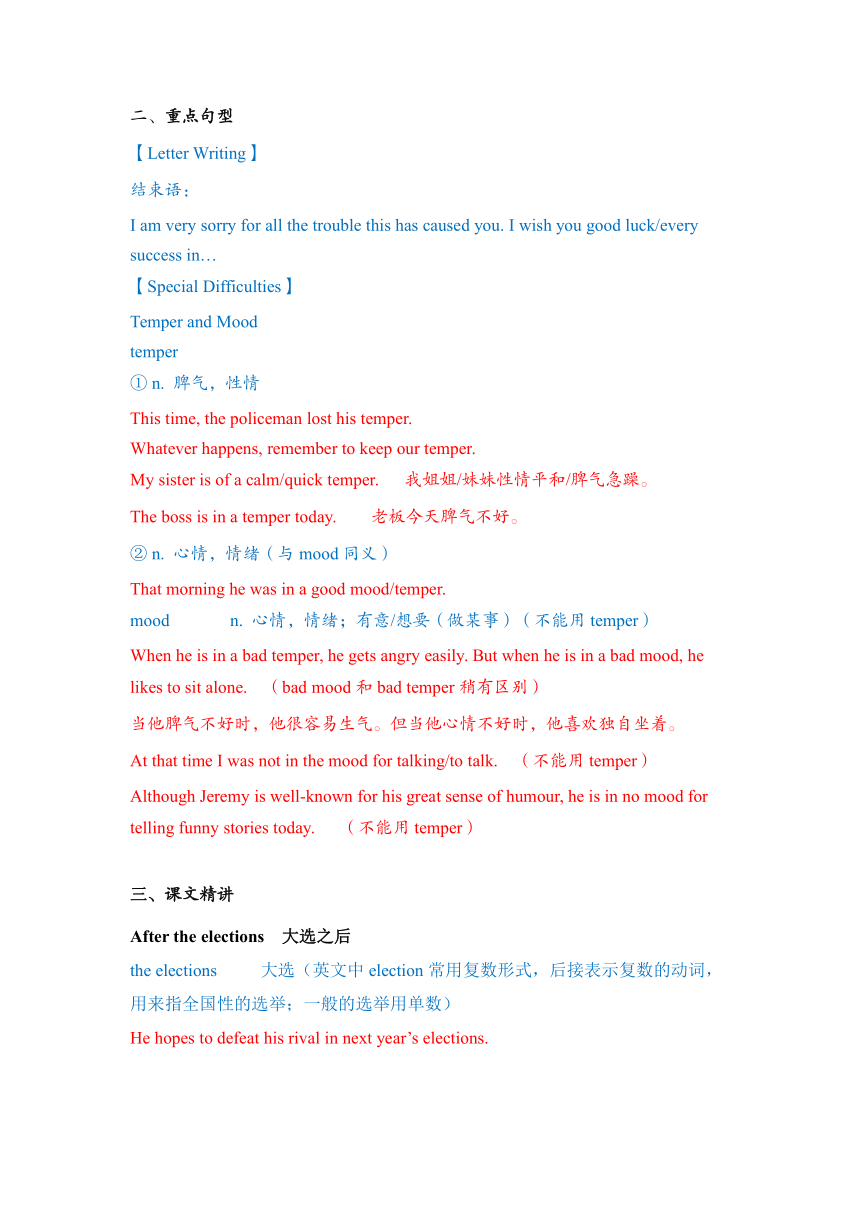新概念第二册Lesson 83 Aftter the elections讲义
文档属性
| 名称 | 新概念第二册Lesson 83 Aftter the elections讲义 |  | |
| 格式 | docx | ||
| 文件大小 | 116.5KB | ||
| 资源类型 | 教案 | ||
| 版本资源 | 新概念英语 | ||
| 科目 | 英语 | ||
| 更新时间 | 2024-11-25 16:25:14 | ||
图片预览




文档简介
新概念第二册
Lesson 83 Aftter the elections
单词精讲
election[i'lek n] n.选举
引申:可引申为民主进程、政治变革的关键环节,是公民参与政治决策的一种方式,也可表示为获取权力或职位的竞争过程。
搭配:general election(大选);presidential election(总统选举);hold an election(举行选举)。
例句:The general election will be held next month.(下个月将举行大选。)
former ['f :m ]a.从前的
引申:可引申为过去的、之前存在的状态或身份,常用来表示与现在相对的过去情况,也可表示以前的人或事物具有某种特定的属性或关系。
搭配:former president(前总统);former colleague(以前的同事);the former(前者,与the latter相对)。
例句:The former champion is now retired.(这位前冠军现在已经退役了。)
词源:源自古英语“forma”,表示“第一的、首要的”,后来引申为“以前的、从前的”。
defeat[di'fi:t] v.打败
引申:可引申为战胜困难、克服障碍的意思,不仅仅局限于战胜对手,也可表示使计划、想法等无法实现。
搭配:defeat the enemy(打败敌人);defeat a purpose(挫败一个目的);suffer defeat(遭受失败)
例句:Our team defeated their opponents in the final.(我们队在决赛中打败了对手。)
fanatical [f 'n tik l]a.狂热的
引申:可引申为过度热情、极端投入的状态,这种热情可能是对宗教、政治、爱好等方面的过度追捧,甚至失去理智。
搭配:fanatical supporter(狂热的支持者);fanatical about(对……狂热)。
例句:He is fanatical about football.(他对足球很狂热。)
词源:源自“fanatic”,而“fanatic”来自拉丁语“fanaticus”,最初表示与宗教狂热有关的人。
opponent [ 'p un nt]n.反对者,对手
引申:可引申为在竞争、辩论或斗争中的对立面,包括思想、观点、利益等方面的对立者,不一定只是人,也可以是组织、团体等。
搭配:political opponent(政治对手);beat one's opponent(打败对手);face an opponent(面对对手)。
例句:His opponent in the debate put forward some strong arguments.(他在辩论中的对手提出了一些有力的论点。)
radical['r dik l] a.激进的
引申:可引申为彻底的、根本的变革者,这种变革往往是对传统观念、制度等进行大幅度的、甚至是颠覆性的改变。
搭配:radical change(彻底的改变);radical idea(激进的想法);radical reform(激进的改革)
例句:They proposed some radical reforms to the education system.
(他们对教育制度提出了一些激进的改革方案。)
词源:源自拉丁语“radix”,意思是“根”,表示从根源上进行改变。
progressive [pr 'gresiv]a.进步的
引申:可引申为向前发展、不断改进的状态或趋势,通常表示在思想、社会、技术等方面朝着更好的方向发展。
搭配:progressive movement(进步运动);progressive ideas(进步的思想);progressive society(进步的社会)
例句:This is a very progressive company that always encourages innovation.
(这是一家非常进步的公司,总是鼓励创新。)
词源:源自“progress”,表示“前进、进步”,加上后缀“-ive”构成形容词。
ex- prefix.(前缀,用于名词前)前…
引申:可引申为表示过去的身份、地位或关系已经结束,有一种脱离、不再是的含义。
搭配:ex - president(前总统);ex - husband(前夫);ex - employee(前雇员)。
例句:Her ex - boyfriend is now living in another city.
(她的前男友现在住在另一个城市。)
词源:源自拉丁语,表示“out of,from”,有从……出来、离开的意思。
suspicious [s 'spi s]a.怀疑的
引申:可引申为不信任、心存疑虑的态度,对人、事、物的可靠性、真实性等表示怀疑。
搭配:be suspicious of(对……怀疑);suspicious behavior(可疑的行为);look suspicious(看起来可疑)
例句:I am always suspicious of people who are too nice.
(我总是对那些过于友善的人表示怀疑。)
词源:源自拉丁语“suspicere”,意思是“向上看、怀疑”。
重点句型
【Letter Writing】
结束语:
I am very sorry for all the trouble this has caused you. I wish you good luck/every success in…
【Special Difficulties】
Temper and Mood
temper
① n. 脾气,性情
This time, the policeman lost his temper.
Whatever happens, remember to keep our temper.
My sister is of a calm/quick temper. 我姐姐/妹妹性情平和/脾气急躁。
The boss is in a temper today. 老板今天脾气不好。
② n. 心情,情绪(与mood同义)
That morning he was in a good mood/temper.
mood n. 心情,情绪;有意/想要(做某事)(不能用temper)
When he is in a bad temper, he gets angry easily. But when he is in a bad mood, he likes to sit alone. (bad mood和bad temper稍有区别)
当他脾气不好时,他很容易生气。但当他心情不好时,他喜欢独自坐着。
At that time I was not in the mood for talking/to talk. (不能用temper)
Although Jeremy is well-known for his great sense of humour, he is in no mood for telling funny stories today. (不能用temper)
课文精讲
After the elections 大选之后
the elections 大选(英文中election常用复数形式,后接表示复数的动词,用来指全国性的选举;一般的选举用单数)
He hopes to defeat his rival in next year’s elections.
The former Prime Minister, Mr. Wentworth Lane, was defeated in the recent elections.
former adj. 以前的,从前的,前任的(后跟名词)
Yesterday, he received a letter from his former wife/English teacher.
Prime Minister 首相
He is now retiring from political life and has gone abroad.
前首相温特沃兹.莱恩先生在最近的大选中被击败。他现在退出了政界,到国外去了。
这是一个由并列连词“and”连接的并列句。“He is now retiring from political life”是其中一个句子,“He”是主语,“is retiring”是现在进行时,表示正在进行的动作,“from political life”是介词短语作状语,表示退出的领域。“has gone abroad”是另一个句子,“has gone”是现在完成时,表示已经发生的动作,“abroad”是副词作状语,表示地点。
“retire from”是固定短语,意为“从……退休、退出”。“go abroad”表示“出国”。
My friend, Patrick, has always been a fanatical opponent of Mr. Lane's Radical Progressive Party.
我的朋友帕特里克一直是莱恩先生的激进党的强烈反对者。
这是一个简单句。“My friend, Patrick”是句子的主语,“has always been”是现在完成时,表示从过去一直持续到现在的状态,“a fanatical opponent”是表语,其中“fanatical”是形容词作定语修饰“opponent”,“of Mr. Lane's Radical Progressive Party”是介词短语作后置定语,修饰“opponent”。
“fanatical”表示“狂热的”,强调程度很高的热情或反对态度。“opponent”表示“对手、反对者”。“Radical Progressive Party”是一个政党名称,“radical”表示“激进的”,“progressive”表示“进步的”。
After the elections, Patrick went to the former Prime Minister's house.
大选结束后,帕特里克来到了前首相的住处。
这是一个简单句。“After the elections”是时间状语,“Patrick”是主语,“went”是谓语动词,“to the former Prime Minister's house”是介词短语作地点状语。
“former”在这里再次强调是之前的首相的房子。
When he asked if Mr. Lane lived there, the policeman on duty told him that since his defeat, the ex - Prime Minister had gone abroad.
当他询问莱恩先生是否住在那里时,值班的警察告诉他这位前首相落选后出国去了。
这是一个复合句。“When he asked if Mr. Lane lived there”是时间状语从句,其中“he”是从句的主语,“asked”是谓语动词,“if Mr. Lane lived there”是宾语从句。“the policeman on duty told him that since his defeat, the ex - Prime Minister had gone abroad”是主句,“the policeman on duty”是主语,“told”是谓语动词,“him”是间接宾语,“that since his defeat, the ex - Prime Minister had gone abroad”是宾语从句,在这个宾语从句中,“since his defeat”是时间状语,“the ex - Prime Minister”是主语,“had gone”是过去完成时,表示在过去某个时间之前已经发生的动作,“abroad”是副词作状语。
“on duty”是固定短语,表示“值班、当班”。“ex - Prime Minister”中的“ex -”是前缀,表示“前……”。
On the following day, Patrick went to the house again.
这是一个简单句。“On the following day”是时间状语,“Patrick”是主语,“went”是谓语动词,“to the house again”是介词短语作地点状语。
“following”表示“接下来的、随后的”。
The same policeman was just walking slowly past the entrance, when Patrick asked the same question.第二天,帕特里克再次来到首相的住处。昨天的那位警察正从门口慢慢走过,帕特里克上前问了和昨天同样的问题。
这是一个复合句。“The same policeman was just walking slowly past the entrance”是主句,是过去进行时,表示过去某个时刻正在进行的动作,“The same policeman”是主语,“was walking”是谓语动词,“slowly”是副词作状语,“past the entrance”是介词短语作地点状语。“when Patrick asked the same question”是时间状语从句,“Patrick”是从句的主语,“asked”是谓语动词,“the same question”是宾语。
“slowly”表示“缓慢地”,用来修饰“walk”这个动作。
Though a little suspicious this time, the policeman gave him the same answer.
虽然那位警察这次有点疑心,但还是对他作了同样的回答。
这是一个让步状语从句。如果从句的主语和主句的相同而谓语带系动词be,则主语+be可省略;但原因状语从句的省略形式要带分词being:
If possible, please let me know by this evening.
如果可能的话,请今晚以前告诉我。
Being worried about his child, he walked up and down in the room.
The day after, Patrick went to the house once more and asked exactly the same question.第三天,帕特里克又去了,提出了同前两天完全一样的问题。
这是一个由并列连词“and”连接的并列句。“The day after”是时间状语,“Patrick”是主语,“went to the house once more”是其中一个句子,“went”是谓语动词,“to the house once more”是介词短语作地点状语。“asked exactly the same question”是另一个句子,“asked”是谓语动词,“exactly the same question”是宾语。
“exactly”表示“确切地、完全地”,用来强调问题的一致性。
This time, the policeman lost his temper.'I told you yesterday and the day before yesterday,' he shouted, 'Mr. Lane was defeated in the elections. He has retired from political life and gone to live abroad!'
这一次警察火了。我昨天和前天都告诉过您了,”他大叫着,“莱恩先生在大选中被击败了,他已经退出了政界去国外了!”
lost his temper 发脾气
'I know,' answered Patrick, 'but I love to hear you say it!'
“这我都知道,”帕特里克说,“可我就是喜欢听你说出这此!”
这是一个包含直接引语的句子。“'I know,'”是直接引语中的一个句子,“I”是主语,“know”是谓语动词。“answered Patrick”是句子的叙述部分,“Patrick”是主语,“answered”是谓语动词。“'but I love to hear you say it!'”是直接引语中的另一个句子,“but”是并列连词,“I”是主语,“love”是谓语动词,“to hear you say it”是不定式短语作宾语,其中“you”是“hear”的宾语,“say it”是不带to的不定式作宾语补足语。
“love to do sth.”表示“喜欢做某事”。
Lesson 83 Aftter the elections
单词精讲
election[i'lek n] n.选举
引申:可引申为民主进程、政治变革的关键环节,是公民参与政治决策的一种方式,也可表示为获取权力或职位的竞争过程。
搭配:general election(大选);presidential election(总统选举);hold an election(举行选举)。
例句:The general election will be held next month.(下个月将举行大选。)
former ['f :m ]a.从前的
引申:可引申为过去的、之前存在的状态或身份,常用来表示与现在相对的过去情况,也可表示以前的人或事物具有某种特定的属性或关系。
搭配:former president(前总统);former colleague(以前的同事);the former(前者,与the latter相对)。
例句:The former champion is now retired.(这位前冠军现在已经退役了。)
词源:源自古英语“forma”,表示“第一的、首要的”,后来引申为“以前的、从前的”。
defeat[di'fi:t] v.打败
引申:可引申为战胜困难、克服障碍的意思,不仅仅局限于战胜对手,也可表示使计划、想法等无法实现。
搭配:defeat the enemy(打败敌人);defeat a purpose(挫败一个目的);suffer defeat(遭受失败)
例句:Our team defeated their opponents in the final.(我们队在决赛中打败了对手。)
fanatical [f 'n tik l]a.狂热的
引申:可引申为过度热情、极端投入的状态,这种热情可能是对宗教、政治、爱好等方面的过度追捧,甚至失去理智。
搭配:fanatical supporter(狂热的支持者);fanatical about(对……狂热)。
例句:He is fanatical about football.(他对足球很狂热。)
词源:源自“fanatic”,而“fanatic”来自拉丁语“fanaticus”,最初表示与宗教狂热有关的人。
opponent [ 'p un nt]n.反对者,对手
引申:可引申为在竞争、辩论或斗争中的对立面,包括思想、观点、利益等方面的对立者,不一定只是人,也可以是组织、团体等。
搭配:political opponent(政治对手);beat one's opponent(打败对手);face an opponent(面对对手)。
例句:His opponent in the debate put forward some strong arguments.(他在辩论中的对手提出了一些有力的论点。)
radical['r dik l] a.激进的
引申:可引申为彻底的、根本的变革者,这种变革往往是对传统观念、制度等进行大幅度的、甚至是颠覆性的改变。
搭配:radical change(彻底的改变);radical idea(激进的想法);radical reform(激进的改革)
例句:They proposed some radical reforms to the education system.
(他们对教育制度提出了一些激进的改革方案。)
词源:源自拉丁语“radix”,意思是“根”,表示从根源上进行改变。
progressive [pr 'gresiv]a.进步的
引申:可引申为向前发展、不断改进的状态或趋势,通常表示在思想、社会、技术等方面朝着更好的方向发展。
搭配:progressive movement(进步运动);progressive ideas(进步的思想);progressive society(进步的社会)
例句:This is a very progressive company that always encourages innovation.
(这是一家非常进步的公司,总是鼓励创新。)
词源:源自“progress”,表示“前进、进步”,加上后缀“-ive”构成形容词。
ex- prefix.(前缀,用于名词前)前…
引申:可引申为表示过去的身份、地位或关系已经结束,有一种脱离、不再是的含义。
搭配:ex - president(前总统);ex - husband(前夫);ex - employee(前雇员)。
例句:Her ex - boyfriend is now living in another city.
(她的前男友现在住在另一个城市。)
词源:源自拉丁语,表示“out of,from”,有从……出来、离开的意思。
suspicious [s 'spi s]a.怀疑的
引申:可引申为不信任、心存疑虑的态度,对人、事、物的可靠性、真实性等表示怀疑。
搭配:be suspicious of(对……怀疑);suspicious behavior(可疑的行为);look suspicious(看起来可疑)
例句:I am always suspicious of people who are too nice.
(我总是对那些过于友善的人表示怀疑。)
词源:源自拉丁语“suspicere”,意思是“向上看、怀疑”。
重点句型
【Letter Writing】
结束语:
I am very sorry for all the trouble this has caused you. I wish you good luck/every success in…
【Special Difficulties】
Temper and Mood
temper
① n. 脾气,性情
This time, the policeman lost his temper.
Whatever happens, remember to keep our temper.
My sister is of a calm/quick temper. 我姐姐/妹妹性情平和/脾气急躁。
The boss is in a temper today. 老板今天脾气不好。
② n. 心情,情绪(与mood同义)
That morning he was in a good mood/temper.
mood n. 心情,情绪;有意/想要(做某事)(不能用temper)
When he is in a bad temper, he gets angry easily. But when he is in a bad mood, he likes to sit alone. (bad mood和bad temper稍有区别)
当他脾气不好时,他很容易生气。但当他心情不好时,他喜欢独自坐着。
At that time I was not in the mood for talking/to talk. (不能用temper)
Although Jeremy is well-known for his great sense of humour, he is in no mood for telling funny stories today. (不能用temper)
课文精讲
After the elections 大选之后
the elections 大选(英文中election常用复数形式,后接表示复数的动词,用来指全国性的选举;一般的选举用单数)
He hopes to defeat his rival in next year’s elections.
The former Prime Minister, Mr. Wentworth Lane, was defeated in the recent elections.
former adj. 以前的,从前的,前任的(后跟名词)
Yesterday, he received a letter from his former wife/English teacher.
Prime Minister 首相
He is now retiring from political life and has gone abroad.
前首相温特沃兹.莱恩先生在最近的大选中被击败。他现在退出了政界,到国外去了。
这是一个由并列连词“and”连接的并列句。“He is now retiring from political life”是其中一个句子,“He”是主语,“is retiring”是现在进行时,表示正在进行的动作,“from political life”是介词短语作状语,表示退出的领域。“has gone abroad”是另一个句子,“has gone”是现在完成时,表示已经发生的动作,“abroad”是副词作状语,表示地点。
“retire from”是固定短语,意为“从……退休、退出”。“go abroad”表示“出国”。
My friend, Patrick, has always been a fanatical opponent of Mr. Lane's Radical Progressive Party.
我的朋友帕特里克一直是莱恩先生的激进党的强烈反对者。
这是一个简单句。“My friend, Patrick”是句子的主语,“has always been”是现在完成时,表示从过去一直持续到现在的状态,“a fanatical opponent”是表语,其中“fanatical”是形容词作定语修饰“opponent”,“of Mr. Lane's Radical Progressive Party”是介词短语作后置定语,修饰“opponent”。
“fanatical”表示“狂热的”,强调程度很高的热情或反对态度。“opponent”表示“对手、反对者”。“Radical Progressive Party”是一个政党名称,“radical”表示“激进的”,“progressive”表示“进步的”。
After the elections, Patrick went to the former Prime Minister's house.
大选结束后,帕特里克来到了前首相的住处。
这是一个简单句。“After the elections”是时间状语,“Patrick”是主语,“went”是谓语动词,“to the former Prime Minister's house”是介词短语作地点状语。
“former”在这里再次强调是之前的首相的房子。
When he asked if Mr. Lane lived there, the policeman on duty told him that since his defeat, the ex - Prime Minister had gone abroad.
当他询问莱恩先生是否住在那里时,值班的警察告诉他这位前首相落选后出国去了。
这是一个复合句。“When he asked if Mr. Lane lived there”是时间状语从句,其中“he”是从句的主语,“asked”是谓语动词,“if Mr. Lane lived there”是宾语从句。“the policeman on duty told him that since his defeat, the ex - Prime Minister had gone abroad”是主句,“the policeman on duty”是主语,“told”是谓语动词,“him”是间接宾语,“that since his defeat, the ex - Prime Minister had gone abroad”是宾语从句,在这个宾语从句中,“since his defeat”是时间状语,“the ex - Prime Minister”是主语,“had gone”是过去完成时,表示在过去某个时间之前已经发生的动作,“abroad”是副词作状语。
“on duty”是固定短语,表示“值班、当班”。“ex - Prime Minister”中的“ex -”是前缀,表示“前……”。
On the following day, Patrick went to the house again.
这是一个简单句。“On the following day”是时间状语,“Patrick”是主语,“went”是谓语动词,“to the house again”是介词短语作地点状语。
“following”表示“接下来的、随后的”。
The same policeman was just walking slowly past the entrance, when Patrick asked the same question.第二天,帕特里克再次来到首相的住处。昨天的那位警察正从门口慢慢走过,帕特里克上前问了和昨天同样的问题。
这是一个复合句。“The same policeman was just walking slowly past the entrance”是主句,是过去进行时,表示过去某个时刻正在进行的动作,“The same policeman”是主语,“was walking”是谓语动词,“slowly”是副词作状语,“past the entrance”是介词短语作地点状语。“when Patrick asked the same question”是时间状语从句,“Patrick”是从句的主语,“asked”是谓语动词,“the same question”是宾语。
“slowly”表示“缓慢地”,用来修饰“walk”这个动作。
Though a little suspicious this time, the policeman gave him the same answer.
虽然那位警察这次有点疑心,但还是对他作了同样的回答。
这是一个让步状语从句。如果从句的主语和主句的相同而谓语带系动词be,则主语+be可省略;但原因状语从句的省略形式要带分词being:
If possible, please let me know by this evening.
如果可能的话,请今晚以前告诉我。
Being worried about his child, he walked up and down in the room.
The day after, Patrick went to the house once more and asked exactly the same question.第三天,帕特里克又去了,提出了同前两天完全一样的问题。
这是一个由并列连词“and”连接的并列句。“The day after”是时间状语,“Patrick”是主语,“went to the house once more”是其中一个句子,“went”是谓语动词,“to the house once more”是介词短语作地点状语。“asked exactly the same question”是另一个句子,“asked”是谓语动词,“exactly the same question”是宾语。
“exactly”表示“确切地、完全地”,用来强调问题的一致性。
This time, the policeman lost his temper.'I told you yesterday and the day before yesterday,' he shouted, 'Mr. Lane was defeated in the elections. He has retired from political life and gone to live abroad!'
这一次警察火了。我昨天和前天都告诉过您了,”他大叫着,“莱恩先生在大选中被击败了,他已经退出了政界去国外了!”
lost his temper 发脾气
'I know,' answered Patrick, 'but I love to hear you say it!'
“这我都知道,”帕特里克说,“可我就是喜欢听你说出这此!”
这是一个包含直接引语的句子。“'I know,'”是直接引语中的一个句子,“I”是主语,“know”是谓语动词。“answered Patrick”是句子的叙述部分,“Patrick”是主语,“answered”是谓语动词。“'but I love to hear you say it!'”是直接引语中的另一个句子,“but”是并列连词,“I”是主语,“love”是谓语动词,“to hear you say it”是不定式短语作宾语,其中“you”是“hear”的宾语,“say it”是不带to的不定式作宾语补足语。
“love to do sth.”表示“喜欢做某事”。
同课章节目录
